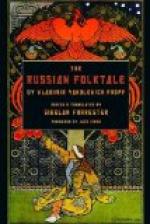a party they too like to bring something home;
but they wouldn’t think of hiding goodies
in their hands. They are fortunate enough
to have their hostess give them a toy animal or a box
of sweetmeats, a tiny dolly or a gay balloon,
as a souvenir. The greediness and selfishness
of the Sun and Wind impress little children,
for these are perhaps the two sins possible to
childhood; and all children will fully appreciate why
the Sun and the Wind received so swiftly the
punishment they deserved. The thoughtfulness
of the loving gentle Moon to remember her Mother
the Star, appeals to them. The rapid punishment,
well-deserved, and the simplicity of the story with
its one point, make it a very good tale for little
children. The whole effect is pleasing.
What children recall is the motherly Star; and
the beautiful Moon, who was cool and calm and
bright as a reward for being good.
The structure of the tale is neat and orderly, dominated by a single theme. The form of the tale, as given in Jacobs’s Indian Tales, shows a good use of telling expressions; such as, “the Mother waited alone for her children’s return,” “Kept watch with her little bright eye,” “the Moon, shaking her hands showered down such a choice dinner,” etc. Here we have too, the use of concrete, visualized expressions and direct language. There is also a good use of repetition, which aids the child in following the plot and which clarifies the meaning. The Mother Star, when pronouncing a punishment upon Sun, repeated his own words as he had spoken when returning from the dinner: “I went out to enjoy myself with my friends.” In her speech to Wind she included his own remark: “I merely went for my own pleasure.”—The examination of this tale shows that it stands well the complete test applied here to the fairy tale.
The Straw Ox
The Straw Ox is an accumulative tale which has sufficient plot to illustrate the fine points of the old tale completely. A poor woman who could barely earn a living had an idea and carried it out successfully.—Her need immediately wins sympathy in her behalf.—She asked her husband to make her a straw ox and smear it with tar. Then placing it in the field where she spun, she called out, “Graze away, little Ox, graze away, while I spin my flax!” First a Bear came out of the Wood and got caught by the tar so that the Straw Ox dragged him home. The old Man then put the Bear in the cellar. Then a Wolf, a Fox, and a Hare got caught in the same way and also were consigned to the cellar.—The plot has so far built itself up by an orderly succession of incidents.—But just when the Man is preparing to kill the animals, they save their lives by promising vicarious offerings: The Bear promises honey; the Wolf a flock of sheep; the Fox a flock of geese; and the Hare kale and cauliflower.—Then the plot, having tied itself into a knot, unties




